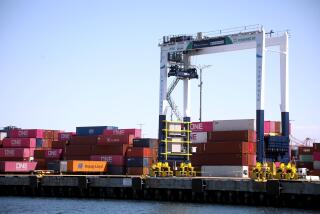Driving on Hydrogen Power--It’s a Gas : NEXT L.A.: A look at issues, people and ideas helping to shape the emerging metropolis.
- Share via
In school, James Heffel was an auto-shop junkie, and he fondly remembers one of his first challenges as a teen-ager tinkering under the hood: turbocharging a Volkswagen bug.
Now he’s envisioning Southern California freeways crowded with vehicles powered by hydrogen.
At his research and development lab at UC Riverside’s College of Engineering, Heffel and his student scientists have developed a hydrogen-fueled Ford Ranger pickup to study its feasibility as a cleaner alternative to gasoline-powered vehicles.
Renewable hydrogen, Heffel says, may prove to be an improvement even on electricity, propane and natural gas as California tries to wean itself from the current generation of polluting, gasoline-powered engines.
Heffel’s lab is one of a handful around the nation--such as those at UC Davis, the University of Miami and U.S. Department of Energy facilities near Denver--where scientists are studying the question.
The catalyst for much of the research into hydrogen-fueled vehicles is a California law requiring that by 1998, at least 2% of new cars sold in the state be emission-free. For now, the immediate future seems rooted in pint-sized cars powered by batteries that require recharging every 100 miles or so.
Heffel has a grander dream: Break water into its constituent parts, release oxygen back into the atmosphere and store the hydrogen for virtually emission-free combustion in a modified 2.3-liter, four-cylinder gasoline engine.
“We can build hydrogen-fueled cars now, but they’re not cost-effective,” he said. “Hydrogen is far more expensive than gasoline. And we have one of those fundamental chicken-and-the-egg problems: Where do you go to fill up your vehicle?
“There aren’t any hydrogen stations down at the corner. No one wants to build one until the cars are out there, and no one wants to build the cars until there are hydrogen stations.”
And then there’s a little hydrogen P.R. problem to overcome, he concedes.
“When I take our prototype pickup truck out on display and tell people it runs on hydrogen,” Heffel said, “everyone says, ‘Ooh, hydrogen?’ And they all take a few steps back.”
He’s even had trouble getting permission to run the pickup on the Bonneville Salt Flats in Utah to try to set a speed record for hydrogen-powered vehicles. He is sure that if he tweaks the engine a little, he can top 100 m.p.h.
“But when I called them, they said, ‘Hydrogen? That’s dangerous stuff, isn’t it?’ And these are guys who are used to handling nitro methane.”
Heffel is not operating in a fantasy land. Three other Ford Rangers have been converted to operate on hydrogen and are expected to be on Southland streets this summer. Two will be operated by Xerox at its El Segundo facility--where it also runs a hydrogen generating system--and the third will be used by the city of West Hollywood.
Heffel’s research at UC Riverside brings him back full-circle to his first love: making cars run better. When he graduated from Cal State Long Beach in 1984 with a degree in mechanical engineering, he didn’t want to chase a career in Detroit and got swept up in the still-healthy local aerospace industry.
In time, he was working on the X-30 space plane, studying how to use hydrogen to cool the craft’s skin as it cooked on its re-entry into the atmosphere.
When he got the call from UC Riverside’s Center for Environmental Research and Technology to study hydrogen-fueled vehicles, he jumped at the opportunity. And he said he’s able to carry on a conversation with those outside his specialty longer than before.
“More people understand cars than rockets,” he said.






